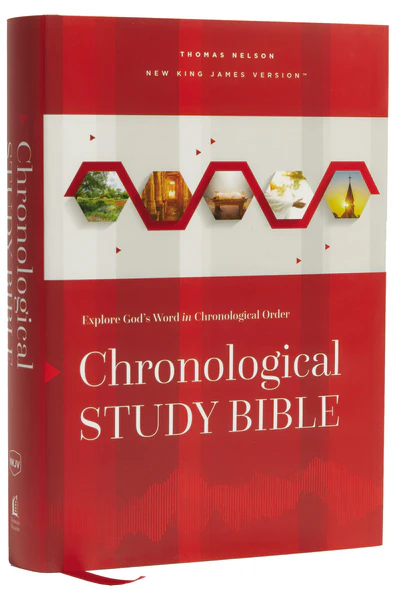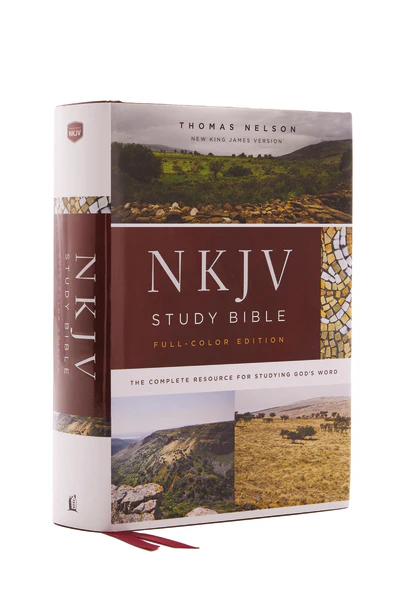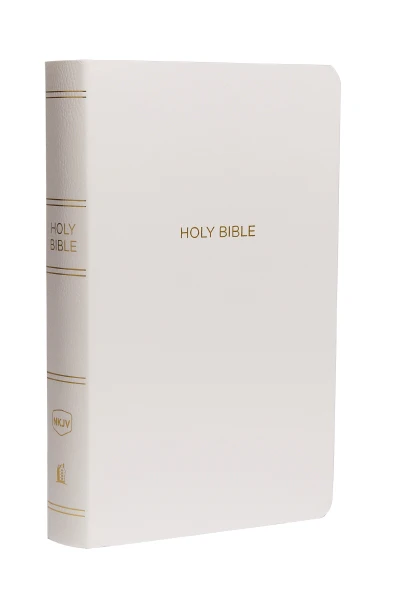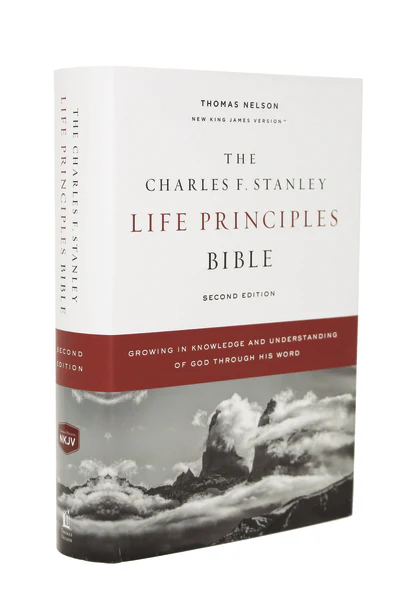Leviticus 13-14
New King James Version
The Law Concerning Leprosy
13 And the Lord spoke to Moses and Aaron, saying: 2 “When a man has on the skin of his body a swelling, (A)a scab, or a bright spot, and it becomes on the skin of his body like a [a]leprous sore, (B)then he shall be brought to Aaron the priest or to one of his sons the priests. 3 The priest shall examine the sore on the skin of the body; and if the hair on the sore has turned white, and the sore appears to be deeper than the skin of his body, it is a leprous sore. Then the priest shall examine him, and pronounce him [b]unclean. 4 But if the bright spot is white on the skin of his body, and does not appear to be deeper than the skin, and its hair has not turned white, then the priest shall isolate the one who has the sore (C)seven days. 5 And the priest shall examine him on the seventh day; and indeed if the sore appears to be as it was, and the sore has not spread on the skin, then the priest shall isolate him another seven days. 6 Then the priest shall examine him again on the seventh day; and indeed if the sore has faded, and the sore has not spread on the skin, then the priest shall pronounce him clean; it is only a scab, and he (D)shall wash his clothes and be clean. 7 But if the scab should at all spread over the skin, after he has been seen by the priest for his cleansing, he shall be seen by the priest again. 8 And if the priest sees that the scab has indeed spread on the skin, then the priest shall pronounce him [c]unclean. It is leprosy.
9 “When the leprous sore is on a person, then he shall be brought to the priest. 10 (E)And the priest shall examine him; and indeed if the swelling on the skin is white, and it has turned the hair white, and there is a spot of raw flesh in the swelling, 11 it is an old leprosy on the skin of his body. The priest shall pronounce him [d]unclean, and shall not isolate him, for he is unclean.
12 “And if leprosy breaks out all over the skin, and the leprosy covers all the skin of the one who has the sore, from his head to his foot, wherever the priest looks, 13 then the priest shall consider; and indeed if the leprosy has covered all his body, he shall pronounce him clean who has the sore. It has all turned (F)white. He is clean. 14 But when raw flesh appears on him, he shall be unclean. 15 And the priest shall examine the raw flesh and pronounce him to be unclean; for the raw flesh is unclean. It is leprosy. 16 Or if the raw flesh changes and turns white again, he shall come to the priest. 17 And the priest shall examine him; and indeed if the sore has turned white, then the priest shall pronounce him clean who has the sore. He is clean.
18 “If the body develops a (G)boil in the skin, and it is healed, 19 and in the place of the boil there comes a white swelling or a bright spot, reddish-white, then it shall be shown to the priest; 20 and if, when the priest sees it, it indeed appears deeper than the skin, and its hair has turned white, the priest shall pronounce him unclean. It is a leprous sore which has broken out of the boil. 21 But if the priest examines it, and indeed there are no white hairs in it, and it is not deeper than the skin, but has faded, then the priest shall isolate him seven days; 22 and if it should at all spread over the skin, then the priest shall pronounce him unclean. It is a [e]leprous sore. 23 But if the bright spot stays in one place, and has not spread, it is the scar of the boil; and the priest shall pronounce him clean.
24 “Or if the body receives a (H)burn on its skin by fire, and the raw flesh of the burn becomes a bright spot, reddish-white or white, 25 then the priest shall examine it; and indeed if the hair of the bright spot has turned white, and it appears deeper than the skin, it is leprosy broken out in the burn. Therefore the priest shall pronounce him unclean. It is a leprous sore. 26 But if the priest examines it, and indeed there are no white hairs in the bright spot, and it is not deeper than the skin, but has faded, then the priest shall isolate him seven days. 27 And the priest shall examine him on the seventh day. If it has at all spread over the skin, then the priest shall pronounce him unclean. It is a leprous sore. 28 But if the bright spot stays in one place, and has not spread on the skin, but has faded, it is a swelling from the burn. The priest shall pronounce him clean, for it is the scar from the burn.
29 “If a man or woman has a sore on the head or the beard, 30 then the priest shall examine the sore; and indeed if it appears deeper than the skin, and there is in it thin yellow hair, then the priest shall pronounce him unclean. It is a scaly leprosy of the head or beard. 31 But if the priest examines the scaly sore, and indeed it does not appear deeper than the skin, and there is no black hair in it, then the priest shall isolate the one who has the scale seven days. 32 And on the seventh day the priest shall examine the sore; and indeed if the scale has not spread, and there is no yellow hair in it, and the scale does not appear deeper than the skin, 33 he shall shave himself, but the scale he shall not shave. And the priest shall isolate the one who has the scale another seven days. 34 On the seventh day the priest shall examine the scale; and indeed if the scale has not spread over the skin, and does not appear deeper than the skin, then the priest shall pronounce him clean. He shall wash his clothes and be clean. 35 But if the scale should at all spread over the skin after his cleansing, 36 then the priest shall examine him; and indeed if the scale has spread over the skin, the priest need not seek for yellow hair. He is unclean. 37 But if the scale appears to be at a standstill, and there is black hair grown up in it, the scale has healed. He is clean, and the priest shall pronounce him clean.
38 “If a man or a woman has bright spots on the skin of the body, specifically white bright spots, 39 then the priest shall look; and indeed if the bright spots on the skin of the body are dull white, it is a white spot that grows on the skin. He is clean.
40 “As for the man whose hair has fallen from his head, he is bald, but he is clean. 41 He whose hair has fallen from his forehead, he is bald on the forehead, but he is clean. 42 And if there is on the bald head or bald (I)forehead a reddish-white sore, it is leprosy breaking out on his bald head or his bald forehead. 43 Then the priest shall examine it; and indeed if the swelling of the sore is reddish-white on his bald head or on his bald forehead, as the appearance of leprosy on the skin of the body, 44 he is a leprous man. He is unclean. The priest shall surely pronounce him [f]unclean; his sore is on his (J)head.
45 “Now the leper on whom the sore is, his clothes shall be torn and his head (K)bare; and he shall (L)cover his mustache, and cry, (M)‘Unclean! Unclean!’ 46 He shall be unclean. All the days he has the sore he shall be unclean. He is unclean, and he shall [g]dwell alone; his dwelling shall be (N)outside the camp.
The Law Concerning Leprous Garments
47 “Also, if a garment has a [h]leprous plague in it, whether it is a woolen garment or a linen garment, 48 whether it is in the warp or woof of linen or wool, whether in leather or in anything made of leather, 49 and if the plague is greenish or reddish in the garment or in the leather, whether in the warp or in the woof, or in anything made of leather, it is a leprous [i]plague and shall be shown to the priest. 50 The priest shall examine the plague and isolate that which has the plague seven days. 51 And he shall examine the plague on the seventh day. If the plague has spread in the garment, either in the warp or in the woof, in the leather or in anything made of leather, the plague is (O)an active leprosy. It is unclean. 52 He shall therefore burn that garment in which is the plague, whether warp or woof, in wool or in linen, or anything of leather, for it is an active leprosy; the garment shall be burned in the fire.
53 “But if the priest examines it, and indeed the plague has not spread in the garment, either in the warp or in the woof, or in anything made of leather, 54 then the priest shall command that they wash the thing in which is the plague; and he shall isolate it another seven days. 55 Then the priest shall examine the plague after it has been washed; and indeed if the plague has not changed its color, though the plague has not spread, it is unclean, and you shall burn it in the fire; it continues eating away, whether the damage is outside or inside. 56 If the priest examines it, and indeed the plague has faded after washing it, then he shall tear it out of the garment, whether out of the warp or out of the woof, or out of the leather. 57 But if it appears again in the garment, either in the warp or in the woof, or in anything made of leather, it is a spreading plague; you shall burn with fire that in which is the plague. 58 And if you wash the garment, either warp or woof, or whatever is made of leather, if the plague has disappeared from it, then it shall be washed a second time, and shall be clean.
59 “This is the law of the leprous plague in a garment of wool or linen, either in the warp or woof, or in anything made of leather, to pronounce it clean or to pronounce it unclean.”
The Ritual for Cleansing Healed Lepers(P)
14 Then the Lord spoke to Moses, saying, 2 “This shall be the law of the [j]leper for the day of his cleansing: He (Q)shall be brought to the priest. 3 And the priest shall go out of the camp, and the priest shall examine him; and indeed, if the [k]leprosy is healed in the leper, 4 then the priest shall command to take for him who is to be cleansed two living and clean birds, (R)cedar wood, (S)scarlet, and (T)hyssop. 5 And the priest shall command that one of the birds be killed in an earthen vessel over running water. 6 As for the living bird, he shall take it, the cedar wood and the scarlet and the hyssop, and dip them and the living bird in the blood of the bird that was killed over the running water. 7 And he shall (U)sprinkle it (V)seven times on him who is to be cleansed from the leprosy, and shall pronounce him clean, and shall let the living bird loose in the open field. 8 He who is to be cleansed (W)shall wash his clothes, shave off all his hair, and (X)wash himself in water, that he may be clean. After that he shall come into the camp, and (Y)shall stay outside his tent seven days. 9 But on the (Z)seventh day he shall shave all the hair off his head and his beard and his eyebrows—all his hair he shall shave off. He shall wash his clothes and wash his body in water, and he shall be clean.
10 “And on the eighth day (AA)he shall take two male lambs without blemish, one ewe lamb of the first year without blemish, three-tenths of an ephah of fine flour mixed with oil as (AB)a grain offering, and one log of oil. 11 Then the priest who makes him clean shall present the man who is to be made clean, and those things, before the Lord, at the door of the tabernacle of meeting. 12 And the priest shall take one male lamb and (AC)offer it as a trespass offering, and the log of oil, and (AD)wave them as a wave offering before the Lord. 13 Then he shall kill the lamb (AE)in the place where he kills the sin offering and the burnt offering, in a holy place; for (AF)as the sin offering is the priest’s, so is the trespass offering. (AG)It is most holy. 14 The priest shall take some of the blood of the trespass offering, and the priest shall put it (AH)on the tip of the right ear of him who is to be cleansed, on the thumb of his right hand, and on the big toe of his right foot. 15 And the priest shall take some of the log of oil, and pour it into the palm of his own left hand. 16 Then the priest shall dip his right finger in the oil that is in his left hand, and shall (AI)sprinkle some of the oil with his finger seven times before the Lord. 17 And of the rest of the oil in his hand, the priest shall put some on the tip of the right ear of him who is to be cleansed, on the thumb of his right hand, and on the big toe of his right foot, on the blood of the trespass offering. 18 The rest of the oil that is in the priest’s hand he shall put on the head of him who is to be cleansed. (AJ)So the priest shall make [l]atonement for him before the Lord.
19 “Then the priest shall offer (AK)the sin offering, and make atonement for him who is to be cleansed from his uncleanness. Afterward he shall kill the burnt offering. 20 And the priest shall offer the burnt offering and the grain offering on the altar. So the priest shall make atonement for him, and he shall be (AL)clean.
21 “But (AM)if he is poor and cannot afford it, then he shall take one male lamb as a trespass offering to be waved, to make atonement for him, [m]one-tenth of an ephah of fine flour mixed with oil as a grain offering, a log of oil, 22 (AN)and two turtledoves or two young pigeons, such as he is able to afford: one shall be a sin offering and the other a burnt offering. 23 (AO)He shall bring them to the priest on the eighth day for his cleansing, to the door of the tabernacle of meeting, before the Lord. 24 (AP)And the priest shall take the lamb of the trespass offering and the log of oil, and the priest shall wave them as a wave offering before the Lord. 25 Then he shall kill the lamb of the trespass offering, (AQ)and the priest shall take some of the blood of the trespass offering and put it on the tip of the right ear of him who is to be cleansed, on the thumb of his right hand, and on the big toe of his right foot. 26 And the priest shall pour some of the oil into the palm of his own left hand. 27 Then the priest shall sprinkle with his right finger some of the oil that is in his left hand seven times before the Lord. 28 And the priest shall put some of the oil that is in his hand on the tip of the right ear of him who is to be cleansed, on the thumb of the right hand, and on the big toe of his right foot, on the place of the blood of the trespass offering. 29 The rest of the oil that is in the priest’s hand he shall put on the head of him who is to be cleansed, to make atonement for him before the Lord. 30 And he shall offer one of (AR)the turtledoves or young pigeons, such as he can afford— 31 such as he is able to afford, the one as a sin offering and the other as a burnt offering, with the grain offering. So the priest shall make atonement for him who is to be cleansed before the Lord. 32 This is the law for one who had a leprous sore, who cannot afford (AS)the usual cleansing.”
The Law Concerning Leprous Houses
33 And the Lord spoke to Moses and Aaron, saying: 34 (AT)“When you have come into the land of Canaan, which I give you as a possession, and (AU)I put the [n]leprous plague in a house in the land of your possession, 35 and he who owns the house comes and tells the priest, saying, ‘It seems to me that there is (AV)some plague in the house,’ 36 then the priest shall command that they empty the house, before the priest goes into it to examine the plague, that all that is in the house may not be made unclean; and afterward the priest shall go in to examine the house. 37 And he shall examine the plague; and indeed if the plague is on the walls of the house with ingrained streaks, greenish or reddish, which appear to be [o]deep in the wall, 38 then the priest shall go out of the house, to the door of the house, and [p]shut up the house seven days. 39 And the priest shall come again on the seventh day and look; and indeed if the plague has spread on the walls of the house, 40 then the priest shall command that they take away the stones in which is the plague, and they shall cast them into an unclean place outside the city. 41 And he shall cause the house to be scraped inside, all around, and the dust that they scrape off they shall pour out in an unclean place outside the city. 42 Then they shall take other stones and put them in the place of those stones, and he shall take other mortar and plaster the house.
43 “Now if the plague comes back and breaks out in the house, after he has taken away the stones, after he has scraped the house, and after it is plastered, 44 then the priest shall come and look; and indeed if the plague has spread in the house, it is (AW)an active leprosy in the house. It is unclean. 45 And he shall break down the house, its stones, its timber, and all the plaster of the house, and he shall carry them outside the city to an unclean place. 46 Moreover he who goes into the house at all while it is shut up shall be [q]unclean (AX)until evening. 47 And he who lies down in the house shall (AY)wash his clothes, and he who eats in the house shall wash his clothes.
48 “But if the priest comes in and examines it, and indeed the plague has not spread in the house after the house was plastered, then the priest shall pronounce the house clean, because the plague is healed. 49 And (AZ)he shall take, to cleanse the house, two birds, cedar wood, scarlet, and hyssop. 50 Then he shall kill one of the birds in an earthen vessel over running water; 51 and he shall take the cedar wood, the hyssop, the scarlet, and the living bird, and dip them in the blood of the slain bird and in the running water, and sprinkle the house seven times. 52 And he shall [r]cleanse the house with the blood of the bird and the running water and the living bird, with the cedar wood, the hyssop, and the scarlet. 53 Then he shall let the living bird loose outside the city in the open field, and (BA)make atonement for the house, and it shall be clean.
54 “This is the law for any (BB)leprous sore and scale, 55 for the (BC)leprosy of a garment (BD)and of a house, 56 (BE)for a swelling and a scab and a bright spot, 57 to (BF)teach when it is unclean and when it is clean. This is the law of leprosy.”
Footnotes
- Leviticus 13:2 Heb. saraath, disfiguring skin diseases, including leprosy, and so in vv. 2–46 and 14:2–32
- Leviticus 13:3 defiled
- Leviticus 13:8 defiled
- Leviticus 13:11 defiled
- Leviticus 13:22 infection
- Leviticus 13:44 altogether defiled
- Leviticus 13:46 live alone
- Leviticus 13:47 A mold, fungus, or similar infestation, and so in vv. 47–59
- Leviticus 13:49 mark
- Leviticus 14:2 See note at 13:2
- Leviticus 14:3 Heb. saraath, disfiguring skin diseases, including leprosy, and so in vv. 2–32
- Leviticus 14:18 Lit. covering
- Leviticus 14:21 Approximately two dry quarts
- Leviticus 14:34 Decomposition by mildew, mold, dry rot, etc., and so in vv. 34–53
- Leviticus 14:37 Lit. lower than the wall
- Leviticus 14:38 quarantine
- Leviticus 14:46 defiled
- Leviticus 14:52 ceremonially cleanse
Acts 17
New King James Version
Preaching Christ at Thessalonica
17 Now when they had passed through Amphipolis and Apollonia, they came to (A)Thessalonica, where there was a synagogue of the Jews. 2 Then Paul, as his custom was, (B)went in to them, and for three Sabbaths (C)reasoned with them from the Scriptures, 3 explaining and demonstrating (D)that the Christ had to suffer and rise again from the dead, and saying, “This Jesus whom I preach to you is the Christ.” 4 (E)And some of them were persuaded; and a great multitude of the devout Greeks, and not a few of the leading women, joined Paul and (F)Silas.
Assault on Jason’s House
5 But the Jews [a]who were not persuaded, [b]becoming (G)envious, took some of the evil men from the marketplace, and gathering a mob, set all the city in an uproar and attacked the house of (H)Jason, and sought to bring them out to the people. 6 But when they did not find them, they dragged Jason and some brethren to the rulers of the city, crying out, (I)“These who have turned the world upside down have come here too. 7 Jason has [c]harbored them, and these are all acting contrary to the decrees of Caesar, (J)saying there is another king—Jesus.” 8 And they troubled the crowd and the rulers of the city when they heard these things. 9 So when they had taken security from Jason and the rest, they let them go.
Ministering at Berea
10 Then (K)the brethren immediately sent Paul and Silas away by night to Berea. When they arrived, they went into the synagogue of the Jews. 11 These were more [d]fair-minded than those in Thessalonica, in that they received the word with all readiness, and (L)searched the Scriptures daily to find out whether these things were so. 12 Therefore many of them believed, and also not a few of the Greeks, prominent women as well as men. 13 But when the Jews from Thessalonica learned that the word of God was preached by Paul at Berea, they came there also and stirred up the crowds. 14 (M)Then immediately the brethren sent Paul away, to go to the sea; but both Silas and Timothy remained there. 15 So those who conducted Paul brought him to Athens; and (N)receiving a command for Silas and Timothy to come to him with all speed, they departed.
The Philosophers at Athens
16 Now while Paul waited for them at Athens, (O)his spirit was provoked within him when he saw that the city was [e]given over to idols. 17 Therefore he reasoned in the synagogue with the Jews and with the Gentile worshipers, and in the marketplace daily with those who happened to be there. 18 [f]Then certain Epicurean and Stoic philosophers encountered him. And some said, “What does this [g]babbler want to say?”
Others said, “He seems to be a proclaimer of foreign gods,” because he preached to them (P)Jesus and the resurrection.
19 And they took him and brought him to the [h]Areopagus, saying, “May we know what this new doctrine is of which you speak? 20 For you are bringing some strange things to our ears. Therefore we want to know what these things mean.” 21 For all the Athenians and the foreigners who were there spent their time in nothing else but either to tell or to hear some new thing.
Addressing the Areopagus
22 Then Paul stood in the midst of the [i]Areopagus and said, “Men of Athens, I perceive that in all things you are very religious; 23 for as I was passing through and considering the objects of your worship, I even found an altar with this inscription:
TO THE UNKNOWN GOD.
Therefore, the One whom you worship without knowing, Him I proclaim to you: 24 (Q)God, who made the world and everything in it, since He is (R)Lord of heaven and earth, (S)does not dwell in temples made with hands. 25 Nor is He worshiped with men’s hands, as though He needed anything, since He (T)gives to all life, breath, and all things. 26 And He has made from one [j]blood every nation of men to dwell on all the face of the earth, and has determined their preappointed times and (U)the boundaries of their dwellings, 27 (V)so that they should seek the Lord, in the hope that they might grope for Him and find Him, (W)though He is not far from each one of us; 28 for (X)in Him we live and move and have our being, (Y)as also some of your own poets have said, ‘For we are also His offspring.’ 29 Therefore, since we are the offspring of God, (Z)we ought not to think that the Divine Nature is like gold or silver or stone, something shaped by art and man’s devising. 30 Truly, (AA)these times of ignorance God overlooked, but (AB)now commands all men everywhere to repent, 31 because He has appointed a day on which (AC)He will judge the world in righteousness by the Man whom He has ordained. He has given assurance of this to all by (AD)raising Him from the dead.”
32 And when they heard of the resurrection of the dead, some mocked, while others said, “We will hear you again on this matter.” 33 So Paul departed from among them. 34 However, some men joined him and believed, among them Dionysius the Areopagite, a woman named Damaris, and others with them.
Footnotes
- Acts 17:5 NU omits who were not persuaded
- Acts 17:5 M omits becoming envious
- Acts 17:7 welcomed
- Acts 17:11 Lit. noble
- Acts 17:16 full of idols
- Acts 17:18 NU, M add also
- Acts 17:18 Lit. seed picker, an idler who makes a living picking up scraps
- Acts 17:19 Lit. Hill of Ares, or Mars’ Hill
- Acts 17:22 Lit. Hill of Ares, or Mars’ Hill
- Acts 17:26 NU omits blood
Scripture taken from the New King James Version®. Copyright © 1982 by Thomas Nelson. Used by permission. All rights reserved.
Bible Gateway Recommends






